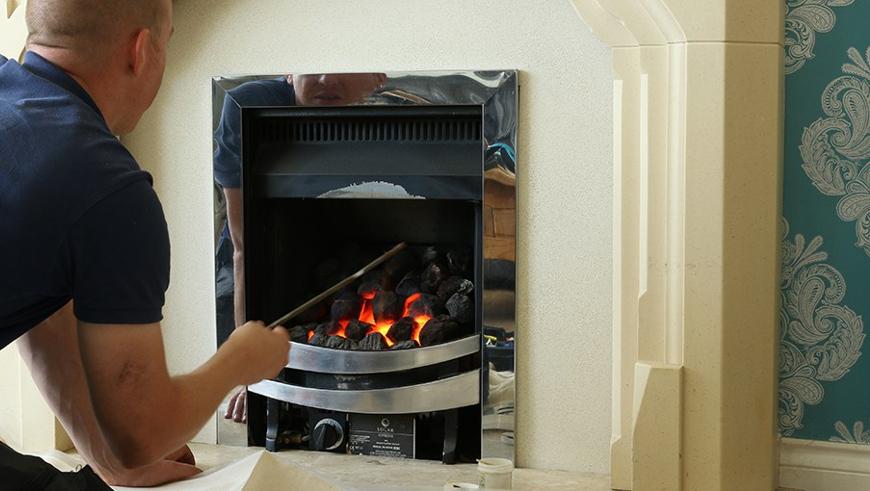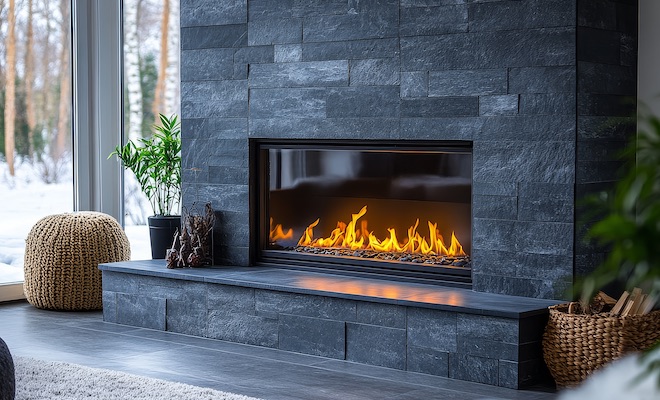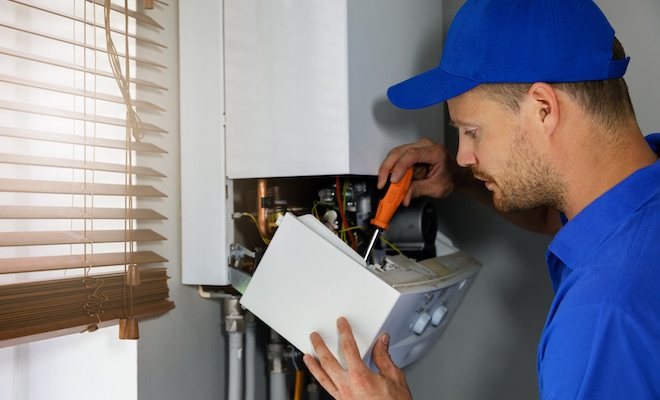Gas Fire Service Cost
Last updated 16th September, 2025
Need to know what a gas fire service costs in the UK?
You're in the right place! This guide covers the cost of a gas fire service in 2025 (around £60), what's involved in a typical gas service, additional costs you may need to budget for, and more!
Let's get started!

How Much to Service a Gas Fire?
A typical annual gas fire safety check and service cost is around £45 to £100 with an average cost of £60.
While a typical gas fire installation cost will be around £200 in total for the labour, plus the cost of the actual gas fire and other materials. When you consider the potential problems caused by incorrect installations, including potentially fatal carbon monoxide poisoning, it does not make any sense to try and fit a gas fire yourself just to save a few pounds!
Once the gas fire is professionally installed, you can then keep it safe and working efficiently by getting an annual gas safety check and service for as little as £45.
Gas Fire Service Prices
Below are some estimated costs of servicing a gas fire:
| Job Description | Avg. Cost | Duration |
|---|---|---|
| Annual gas safety check and service of a gas fire | £45 - £60 | 1 Hour or less |
Free Gas Safety Checks
Some energy suppliers and support schemes, such as the Priority Services Register, offer gas safety checks free if you are a pensioner, are disabled, or have children under 5 years old. If you think you might be eligible, check with your service provider or local advice services.
A gas safety check assesses the basic safety of the gas fire. Regular servicing is still important even if you have one of these carried out, as a service will include taking the appliance apart and checking the physical condition, as well as performance tests carried out in accordance with the manufacturer's instructions.
Additional Gas Fire Servicing Costs
When servicing your gas fire, there may be additional costs you incur. Let's take a look at a couple of examples.
New Gas Supply Installation
If your gas pipework is outdated or undersized a new gas supply may be required before your service is carried out.
As a guide the average cost of running a gas supply to a property is £300 to £400 if your property is no more than 23 metres from the supply but about £1,000 to £1,250 for an average installation beyond 23 metres.
Boiler Service
As well as getting your gas fire serviced, arranging to get you boiler serviced at the same time could save you money on call-out fees.
Regular servicing ensures your boiler will make sure it is running safely and efficiently. This helps to maintain its performance, could reduce your energy bills, and can extend the lifespan of your heating system.
On average, the cost of a professional annual boiler service in the UK ranges from £90 – £130.
Chimney Sweeping
In some cases, such as a gas fire or log burner, your chimney may also require cleaning (chimney sweeping) as part of ongoing maintenance.
Regular cleaning can help remove any residue or blockages that may have built up in your chimney. The average cost is around £70 to £120 and can vary depending on factors such as the type of appliance and which fuel you use.
Carbon Monoxide Alarm Installation
As a safety feature, you may want to consider fitting a carbon monoxide (CO) alarm at the same time as you gas fire service.
A CO alarm can provide an extra layer of safety with a gas fire by giving an early warning if dangerous levels of this colourless, odourless gas are present.
Installation can usually be carried out by the gas safe engineer for an additional cost. Paying this extra cost now offers ongoing protection for you and your home.
Gas Fire Service Cost Breakdown Calculator
Cost breakdown for an average gas fire servicing.
Total Cost: £60
Materials
£3
Tradesmen
£57
Waste Removal
£0
What Does Servicing a Gas Fire Involve?
For all gas appliances, including gas fires, it is recommended that they are safety checked and serviced at least once a year in accordance with the manufacturer's instructions.
Where this is just a recommendation for homeowners, it is a legal requirement for landlords with rental properties.
You could be putting you and your family at risk if you fail to get your gas fire regularly serviced and checked, as there is a real danger of fire and even fatal carbon monoxide poisoning.
An annual gas safety check in the UK entails getting a Gas Safe registered engineer to inspect your gas fire and making sure it is set up and burning correctly with the right operating pressure. They also check that harmful gases are being removed safely and the ventilation routes are clear.
The annual gas safety check also identifies any defects which may require remedial work. Most registered engineers will also offer gas fire installations as a service.

A typical annual gas fire safety check and service cost is around £45 to £60, but if you notice your gas fire is not working properly, for example, if it is burning with a yellow flame instead of a blue flame, and/or you can see black marks or soot on or around your fire - then you need to call a gas engineer as soon as possible - do not leave it until the annual service is due.
Servicing a gas fire will cost around £60 maximum and is excellent value as it will keep your fire burning efficiently and help to keep your family safe. In addition, Gas Safe engineers will typically also clean the fire up and get it looking just as good as new again for you by cleaning the frets and frames, polishing the brass and spraying the fake coals black again.
Typical gas fire problems include incorrect gas pressure, which will cause the fire to shut down to protect you. Too much draw from the chimney can also cause the fire to shut down as will a blocked chimney.
Most modern gas fires will not operate without a power supply, so check if a fuse has blown or the batteries need to be replaced if the fire does not operate. Other common gas fire problems are usually down to a poor installation.
Gas fires need to be installed in accordance with the manufacturer's instructions and the warranty will be invalid if the fire has been incorrectly installed, so make sure that your gas fire is installed properly by a Gas Safe Registered Engineer who can also provide a certificate showing the work that has been done properly and confirm that the fire is safe.
How Do You Remove a Gas Fire?
Rather than having your gas fire serviced, you may decide to have it replaced with a modern log burner or even removed altogether if no longer in use.
The average cost of removing a gas fire can be between £80 to £120 and should only be carried out by a qualified Gas Safe registered engineer.
It’s also important to factor in additional charges such as waste removal (between £80 to £150) or removing the hearth (£200 to £400). Likewise, in the event there are any safety concerns or you are replacing your gas fire with an alternative appliance, you may also need to remove the chimney (£1,000 to £2,000).

Boiler Service and Chimney Sweeping
As with your gas fire, in order to avoid potential hazards such as carbon monoxide leakage you should arrange for your boiler to also be serviced at least once a year by a qualified engineer. The boiler service is not usually included within your contract and on average will cost between £70 to £120 per visit.

How to Get a Gas Safety Certificate in the UK
In the UK, it is a legal requirement for landlords to obtain a gas safety certificate, which must be renewed on a yearly basis.
The certificate will cost on average between £60 to £90 and can only be provided by a qualified Gas Safe registered engineer following their annual service. It will be issued once the engineer has carried out an inspection on your appliances and checked any related safety precautions.
FAQs
If you are the homeowner, it is your responsibility to ensure all gas appliances are checked by a Gas Safe engineer annually. Many companies will offer annual gas safety checks as part of an insurance policy, which will cover your appliances against breakdown.
An Oxygen Depletion Sensor will detect when oxygen levels in the room fall below a specified level, and then the flame failure device cuts off the gas supply to the fire to make sure it is safe.
However, there are many modern gas fires that do require a battery or mains power supply to operate the ignition or features like flame effects.
The air vent should be fitted by the same Gas Safe engineer who is fitting your fire to ensure it is fitted in accordance with the manufacturer's instructions.










